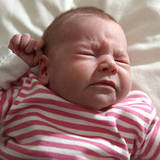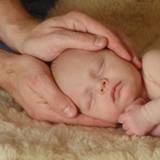Dealing with Common Infant Sleep Problems
Author Name: Heidi Holvoet, PhD
Medical fact-check: Dr Leah Alexander, M.D., F.A.A.P.
Avoid poor nights due to common infant sleep problems and medical reasons baby won't sleep. The doable sleeping tips in this section will help you tackle teething, relieve a cold, avoid wet diaper wake-ups, deal with night terrors, separation anxiety, acid reflux, colic, gas, etc.
Infant sleep problems and most medical reasons baby won't sleep are usually harmless and temporary -
although unfortunately they may
seem
to last forever ...
Sleeping well is not
easy for a young baby and their
parents as it
is.

A newborn must develop the ability to distinguish day from
night. Then later on they
must develop both physically and psychologically to be able to sleep
for long stretches.
Growing day by day, your baby must learn to settle all by themselves and learn
self
soothing when waking at night ...
A lot to cope with already, and
then there is a number of infant sleep problems to challenge
both of you a bit further.
Luckily there are gentle and effective ways to
avoid
many of these disturbances
or, once a baby sleep problem is there,
to
deal with it at best
.
Let's have a look at the most typical infant
sleep problems and how to deal with them below.
Teething
Teething is one of the baby milestones you do not want to
avoid of
course. But because it can be painful or uncomfortable, it easily
becomes a disturbance during naps and nights.
To avoid all this: learn
when
babies
start teething
, how to
recognize early teething signs
and use simple but truly effective
teething
remedies
.
A common cold
Don't blame your baby
How many of us
have not, after
yet another sleepless night, felt a bit
angry
with
our child. We know they cannot help it, and they certainly don't
want to
bug
us.
But still we may have a hard
time being all cuddly and sweet to our babies. And that can make us feel
guilty.
Awful as these feelings may seem towards a tiny helpless infant, they are
in fact
totally normal and acceptable
. Most of it comes from your own exhaustion.
When
we are tired, the first thing to change is our mood. It becomes much
more difficult to be cheerful and happy. That is also the first outcome
of research on sleep deprivation effects.
So, it is OK to feel like that. No need to feel guilty
about it. And also ...
No need to take it personal, your baby is not trying to
hurt
you.
A little
experiment
you might try is to put yourself in
your baby's place.
Imagine how they feel and why they feel like that. Then,
in stead of fighting over it, you
can deal with the issue together, as a team.
Many babies
get mild colds from time to
time: usually a lightly
congested or runny nose.
A few simple
cold tips
can
keep your baby as comfortable
as possible and keep sleeping well also during a cold.
Wet diaper
An
overfull nappy
or wet
diaper is a top cause of unnecessary night wakings, hence the crucial
dry diaper
tips for nights
.
And at the same time we
prepare the right mindset for dry nights later on.
Separation anxiety
Separation
anxiety is an important development phase.
It is
when your little one learns that they are an individual person and takes
the first steps towards
independence
.
In the mean time, the fear of losing you is very real and may make it
difficult for your little one to settle well and make it through the night independently.
Use these
separation anxiety techniques
to guide your child
through this phase successfully, and with a minimum of tears and night awakenings.
Dreams, nightmares and night terrors
There are many
different opinions about if and how young babies dream,
and whether they can have nightmares or night terrors. The fact is that
something dreamlike
can cause
your little one to wake up at night
.
So it's good to know how to recognize and deal with
night
terrors
,
nightmares
and
dreams
.
Reflux
Infant reflus is one of the most common medical reasons baby won't sleep. Reflux comes in two forms: the totally harmless GER (Gastro
Esophageal Reflux) and the less common but more serious GERD (Gastro
Esophageal Reflux Disorder).
Use the
reflux symptoms guide
to find out if your child may be
sleeping poorly because of reflux.
The
infant
reflux sleep tips
effectively help for naps and nights.
See the
newborn
acid reflux page
for specific help for newborns.
Osteopathy can help with relieving reflux and related digestive troubles. Start at the
cranial osteopathy therapy checklist
to find out if an osteopath visit
would be a good idea.
Colic in infants
Colic is best known for its typical crying pattern: prolonged crying in
the evenings that starts at about 3 weeks old, peaks around 6-8 weeks
old and gradually disappears towards 3-4 months old.
See the
colic
in infants
page for the best tried-and-tested colic remedies
and check for
baby
gas
help as well.
Have you considered seeing an osteopath?
Extensive baby crying and
colic are cases where it can help. Carole Chevallier D.O. answers all our questions about
osteopathy
for infant sleep problems
.
Infant sleep problems can be daunting to go through. Your baby is not
in optimal shape and you may worry. Most cases, even medical reasons for poor sleep for your baby, are innocent. Of course, always do consult your doctor if you have any doubt.
And all in all, sometimes there is nothing more you
can do than just
keep
being there
for your baby.
Don't worry if you feel frustrated with your baby because that is
perfectly normal. Remember that most of these issues are
temporary -
a phase
- and
things will get better again soon.
Don't hesitate to contact me if you can't seem to overcome it or with any questions on these topics.









